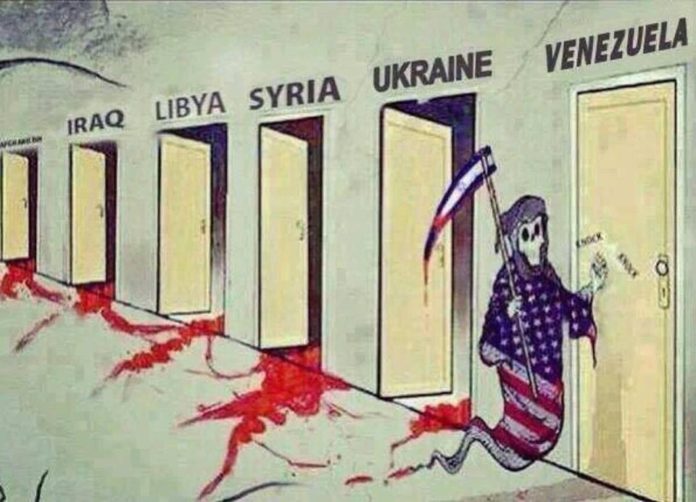LAGOS—Sovereignty is the supreme and ultimate power or authority of a state to govern itself and conduct its affairs without outside interference. Wars are fought, freedoms are lost and won, all upon battles of and for sovereignty. Within the bounds of sovereignty, a nation exacts a right to engage in self-direction, to determine its own path, to govern its citizens, to legislate and rule independently, with little care for the outside opinions of other nations.
In practice, however, sovereignty is not always doled out with even hands. In some cases, people who are otherwise firm adherents to sovereignty actually violate the mantra of self-governance to instead advocate for nations to encroach upon others and prevent their sovereignty.
At the present moment, a democratic process that produced a new world leader in US President Donald Trump, enacting the will of the people, is being protested. Recently Trump signed an executive order to suspend the admission to the US for at least ninety days of foreign nationals from Sudan, Libya, Somalia, Syria, Iran, Iraq, and Yemen—countries that are predominantly Muslim. There is much opposition to this ban, but should other nations overturn one’s sovereignty to make decisions—no matter how harsh or unpopular?
In any case does another nation or ruling body have the authority to combat the orders of a sovereign nation?
Sometimes the answer is “yes.” Many believed that Yahya Jammeh needed to be “dethroned” such that West African troops should mobilize to enact the will of the Gambians who voted for a new leader through a Democratic process. Yet, where were the pro-sovereignty advocates when the will of the majority was ignored during the War in Iraq, which civilians opposed, yet no regional or national troops from the Middle East or the western world were adamant about enacting the will of the people to step in to end the over fifteen-year unrest in the region.
One scourge of the earth that leaves the world’s citizens perplexed and angered is the mass atrocity of the US prison system, which inhumanely houses one quarter of the world’s prison population, many of whom are incarcerated for non-violent reasons that would not be considered offenses in most parts of the world.
And now with a twist of irony, smoking marijuana, a medicinal herb, is legal across several US states, including but not limited to Colorado, Alaska, Massachusetts, Oregon, and California—though each of these states still retains incarcerated people for the very acts that people engage in freely, publicly, and with no criminal recourse. Even the United Nations has spoken against the US incarceration system but to no avail, as the practice of locking up human beings behind bars for the greater parts of their lives—and some ‘til their deaths—still continues.
Is sovereignty to be respected here, in the case of the US, with respect to the country’s mass incarceration policies, or even in the destructive habit of drone warfare, despite human rights violations—which are the basis for infringing upon other nations’ sovereignty?
When is it one nation and its citizens’ responsibility to handle its own battles and when, if ever, should others from outside get into the mix? Surely other nations can aid in facilitating the execution of laws, when rogue individuals violate them, if it is in the wishes of the nation.
But what about international interference when the country itself is committing human rights violations? This was the justification behind invading several Middle Eastern countries whose leaders were said to possess weapons for mass destruction. But then these are the same very weapons that present world leaders amass publicly, for what other purpose than to destroy, whenever necessary and by any means. Although this logic is not used to justify invading these very nations or disarming them of their weapons of mass destruction. Nuclear weapons are only seen as weapons of mass destruction when they fall into unpopular hands.
The idea of open borders and open hemispheres goes against sovereignty of nations. So too does the argument of free trade. Both do not protect nations and citizens from exploitation by outsiders. Where is the opposition to such policies in the name of sovereignty? Is not trespassing upon a nation’s self-rule a paradox in itself that negates the very essence of the concept of sovereignty, a principle that garners admiration and pride for nationhood worldwide?
The practice of sovereignty is not without the stench of hypocrisy. Double standards come to bear. In modern times, sovereignty is another one of those false promises, like democracy, that only stands insofar as it suits the ruling elite and is otherwise discarded in the name of something else when it ceases to suit those in power.
Sovereignty is used to justify not interfering with the government of some and wholly ignored as a defining principle when dealing with the government of others. We keep mum in the name of sovereignty and not trespassing boundaries when it suits powerful nations. We turn a blind eye to sovereignty when those who are powerless use its message to shout for their independence and will to govern themselves.
The obvious double standards that apply broach the issue: can man respect the sovereignty of all nations always or only insofar as a nation’s sovereignty works to his advantage and not in opposition to his own aims? Is there such a thing as allowing something to stand for its own good, or only if that good affects man somehow?
At issue with sovereignty, with the battle for self-regulation, is one philosophy of the selfless and another of the selfish, the latter who puts his desires before all else and the former who allows his own desires to be suppressed for the sanctity of the enactment, for better or worse, of sovereign ideals.











Man gives indifferent names to one and the same thing from the difference of his own passions; he dislikes another’s sentiments about a war, calling it an invasion; but he approves his private opinion about warfare in the same vein, calling it a restoration of democracy; and yet this restoration, this warfare, signifies no more than his private opinion of his own passions. To what end is sovereignty—to what end is the law—if it be approached from the confines of man’s parochial passions?
Nefetiti bends our minds throw the worm-hole of clairvoyance: into appreciating the irony inherent in the politics of today; from America’s wars, from its internal turmoil to the wild terrorism of the Middle East; and finally to the haphazard geopolitical philosophy of our dear motherland. She dispatches with sheer intensity and ease of prose the depth of appreciation we need in order to carefully situate the difficulties in expressing the will of the people and the sovereign will of the state within the measured and gauged aspirations of our passions. But the more I write, the more I spoil it.
Enjoy!
Another enjoyable Gbetohemaa Nefetiti sumptuous food for thought! If only words could prick the consciences of The Beast and its mercenary quislings and hypocritical apologists?!?
At least the troubled Donald Trump has the balls to place the US and Russia, and in fact the rest of the warring world on the same moral plane. There’s no high falutin hypocrisy with this guy, which seems like fresh air when it comes to US politics, unbelievably. When he was accused of being a Putin lover, and summarily accosted to declare that only Putin kills, Trump has this back and forth with Bill O’Relly (the real racist):
Trump: “Will I get along with him? I have no idea. It’s very possible I won’t.”
O’Reilly said: “He’s a killer, though. Putin’s a killer.”
“There are a lot of killers,” Trump replied. “We’ve got a lot of killers. What, do you think our country’s so innocent?”
See? That literally made my day.
That Trump reply was priceless! Someone needed to stand up to the war scaremongers in Washington. At least Trump has some balls. Hate him or like him.
In fact, I have to agree with Kofi Mawuli Klu that “if only words could prick at the consciences of The Beast,” the world would be better. Unfortunately, Nefetiti’s brilliant words, her exquisite composure in writing and her astounding command of wisdom will not change or affect the way the beast thinks! But the beast’s time is numbered. There are other beasts rising, and perhaps in the ensuing jungle, one of these newly arriving beasts might find the conscience to acknowledge the wisdom and tact in this Nefetiti rendition. More, one day I hope that the children of the motherland herself will also rise above the beasts, and finally slay them and restore Ma’at. In any case, at this moment the children must know and learn about the wanton hypocrisy and the high falutin (un)civility with which we are accosted to perceive our world.
Maybe the next generation will be the beast slayers…
I think we need better leaders who are not appointed by neocolonialists if we are to stand up to the hypocrisy and maintain some semblance of sovereignty. Part of that national identity would be a uniform and organic African language to unite people but we would need some dedicated linguists and open-minded citizens for that to happen.
I just finished poring over this essay and it’s mirabile dictu that the grasp of the concept of sovereignty displaced here by Nefetiti is unquestionable. How else are we free if not to be able to control our own destiny? How else is a country sovereign if not to be able to control its own destiny? When sovereignty becomes questionable, under what others purport to be untenable circumstances for an invasion, we all become open for an invasion into our own privacy. What many seem to ignore when they quickly applaud Gambia’s invasion say, is that they refuse to accept that civilized men approach others not by confrontation, but through useful and effective dialogue. There’s always a way with dialogue when it comes to independent men or independent nations. But alas!